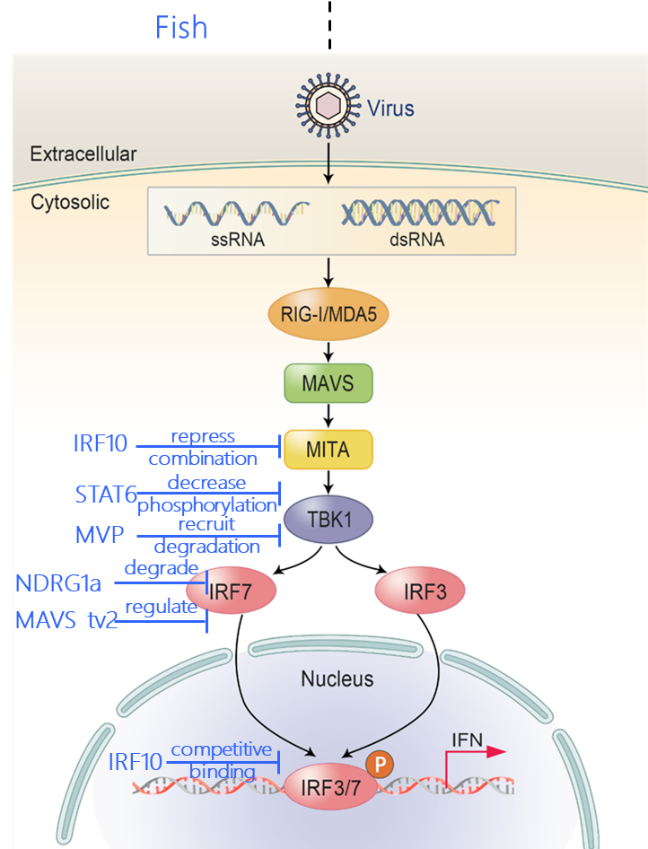
Newsroom
Researchers Reveal Negative Regulation Mechanisms of Fish Interferon
Interferon (IFN) is the cytokine which play the central role in the resistance of host to pathogens. In fish, the retinoic acid-inducible gene I (RIG-I)-like receptor (RLR) signaling pathway to activate IFN expression has been identified as conserved as that in mammals. However, to date, the mechanisms of fish IFN negative regulation remain largely unknown.
In recent years, the Research Group of Fish Molecular Immunology from Institute of Hydrobiology (IHB) of Chinese Academy of Sciences have conducted a series of in-depth studies on mechanisms of fish RLR signaling pathways negative regulation. They identified that zebrafish IFN regulatory factor (IRF) 10 is a novel negative regulator of IFN transcription that represses mediator of IRF3 activation (MITA)-mediated IFN activation and inhibits the activation of the IFN-stimulated response element (ISRE) site of the IFN promoter (Journal of Immunology, 2014). It is recommended by the editor of the Journal of Immunology with the topic of "IRF10: A Cold Shower For Fish IFN".
They also found that the splicing variant of wild-type fish mitochondrial antiviral signaling protein (MAVS)- MAVS_tv2, negatively regulates IFN-mediated IFN production (Fish & Shellfish Immunology, 2015) and the zebrafish STAT6 interacts with TANK-binding kinase 1 (TBK1) and reduces its phosphorylation, leading to the suppression of IFN expression (Developmental & Comparative Immunology, 2017).
Lately, this research group further identified two fish IFN negative regulatory molecules, N-myc downstream-regulated gene (NDRG) 1a and major vault protein (MVP). Fish NDRG1a is associated with IRF7 and promotes the K48-linked ubiquitination and degradation of IRF7, thereby inhibiting IFN expression. Relevant research results have been published online in the Journal of Immunology, 2019.
In addition, fish MVP as a negative regulator of IFN production, it recruits, relocalizes and degrades TBK1 in a lysosome-dependent manner. Relevant research results have also been published online in the Journal of Immunology, 2019, and is recommended by the journal as "Fishy IFN".
The first author of the above researches is Associate Prof. LI Shun and/or Assistant Prof. LU Long-Feng. These findings have filled the gaps in the negative regulation of fish IFN response and deepened the study of fish immune mechanisms.

Figure 1. Negative regulation mechanisms of fish IFN (Image by IHB)